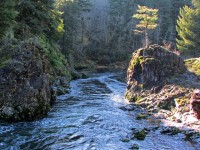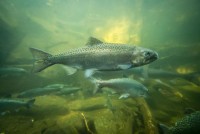“Full fish passage . . . is key to recovery for Lewis River anadromous populations of spring Chinook, winter steelhead, coho and bull trout.”
Give Salmon a Fighting Chance
Read or listen to our newsletter now:
Does it give you goosebumps to watch salmon leap the falls of a wild, undammed river? You’re not alone.

Evolved over millions of years, salmon put on a remarkable show of skill, agility, and determination tackling nature’s challenges. Yet sadly, they didn’t evolve to make it past dams and other human-made barriers.
Columbia Riverkeeper’s “Saving Salmon” program area has primarily focused on removing mega dams like those on the Lower Snake River. Fortunately, with the support of incredible people across the Pacific Northwest, our programs have grown to address another important piece of the salmon recovery puzzle: fish passage in tributaries of the Columbia River where salmon breed. In both Oregon and Washington, Columbia Riverkeeper is engaging in critical efforts to secure fish passage so salmon have a fighting chance when dam removal isn’t on the table, or when culverts prevent salmon from going upstream.
Oregon Fish Passage Kerfuffle
This past December, while my kids were hard at work on their holiday wish lists, the Oregon Dept. of Fish and Wildlife (ODFW) was quietly granting the hydropower industry’s wish: gutting Oregon’s so-called Fish Passage Rules. How? Oregon law requires the construction of fish passage at all artificial barriers, like dams and culverts. Oregon’s administrative rules—which ODFW writes and the Oregon Fish and Wildlife Commission approves—have long defined “fish passage” to mean “volitional” passage, meaning passage that fish can use without human assistance. Without proper public notice or Tribal government consultation, ODFW changed the definition of fish passage to include “trap and transport” fish passage. The change is a big deal for both fish passage and for dam removal.
Trap-and-haul or trap-and-truck fish passage is generally far less effective at moving migratory fish like salmon, trout, and lamprey around dams and other barriers. And the cost of constructing effective volitional fish passage (as opposed to cheap but ineffective trap-and-haul passage) has led to dam removal on Northwest rivers like the Klamath and White Salmon. Accordingly, ODFW’s rule change is likely to undermine recovery for Oregon’s native migratory fish, with negative impacts to Tribes and others whose cultural and economic well-being rely on Oregon’s fisheries. Columbia Riverkeeper is working in solidarity with the Confederated Tribes of the Umatilla Indian Reservation and the Nez Perce Tribe to challenge ODFW’s rule change. First, we drafted an in-depth letter breaking down why the 11th-hour change was unlawful—and got 14 nonprofits to join the letter in support. Second, we exercised our rights under Oregon’s Public Records Law to ask for documents that show why ODFW changed its long-standing rule. Now, if ODFW refuses to comply with state law, we are prepared to take our case to court.
Restoring Fish Passage on the Lewis
The Lewis River Basin is famous for salmon, stunning waterfalls, big trees, blurry bigfoot sightings, and hydroelectric power. On its way to the mighty Columbia, the Lewis River flows through three large reservoirs: Yale, Swift, and Merlin. These reservoirs provide electricity and recreational opportunities. But the dams also stop Lewis River salmon and steelhead from reaching their spawning streams. In 2004, Pacific Corp (a Berkshire Hathaway subsidiary that owns the Lewis River dams) promised the Cowlitz Indian
Tribe, Yakama Nation, and the State of Washington that the dams would be improved to let salmon reach their spawning areas. But shortly afterward, Pacific Corp began a concerted campaign to renege on its promise. Why? Building and running fish passage facilities costs money. If Pacific Corp gets away with breaking its promise, the company could pocket over $100 million. Scientists from the state of Washington, Cowlitz Indian Tribe, Yakama Nation, and the U.S. Fish and Wildlife Service agree that reconnecting salmon with existing, high-quality spawning habitat is the best way to recover the Lewis River’s spring Chinook, coho, steelhead, and bull trout—all listed as threatened under the Endangered Species Act. Starting in 2020, Columbia Riverkeeper began working insolidarity with the Cowlitz Indian Tribe and Yakama Nation, as well as other nonprofit river advocates, to hold Pacific Corp accountable for its promise to restore fish passage throughout the Lewis River. We intervened before the Federal Energy Regulatory Commission and helped pressure the new presidential administration to stand up to PacifiCorp. We also developed creative legal challenges and told the story of Pacifi Corp’s doublespeak to our members and in the media.
We are proud to stand arm-in-arm with Tribes and river advocates and demand fish passage on the Lewis. After many years of uncertainty, things are looking up for Lewis River salmon. During the summer of 2021, the National Marine Fisheries Service reversed a preliminary decision by the Trump Administration that would have allowed Pacific Corp to renege on its promise. Pacific Corp has recently (re)acknowledged the need to build fish passage and is negotiating the details with Tribal, state, and federal fisheries managers. But it’s still not clear when Pacific Corp will start (or finish) building the fish passage facilities it promised to construct long ago. Until then, Columbia Riverkeeper will continue holding Pacific Corp accountable for rebuilding strong salmon runs in the Lewis River.
Salmon Unite Us: Join the Fight for Recovery
Want to hear all the stories from Columbia Riverkeeper's Currents Issue 2, 2023 Newsletter?
Tell Northwest leaders and Pres. Biden to remove Snake River dams, prevent salmon extinction, and honor Tribal rights.



